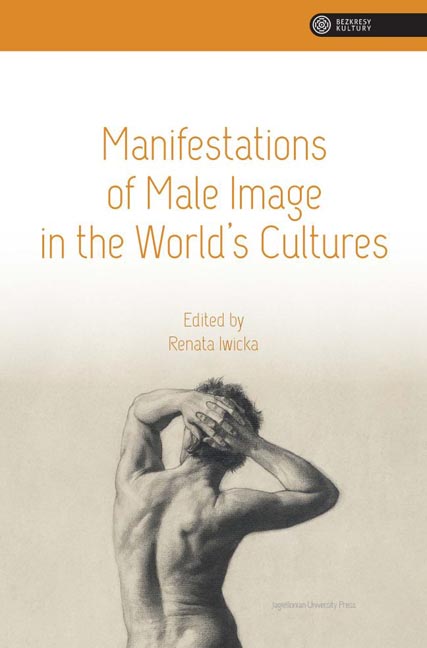Book contents
- Frontmatter
- Contents
- Preface
- “A Jewel Beyond Compare”: Prince Hikaru Genji As A Perfect Male Of The Heian Period In The Light Of Popular Culture Theories
- Cicero and Male Virtue
- Kill The Savage, Save The Man – James Welch’s Chronicle Of Native American History
- On (Self-)Representations Of Masculinity In Siyāmak Herawi’s Short Stories
- Power, Masculinity, And War: Superman, A Case Study
- Redefining New Masculinity In Korean Television Drama Series
- Stripping The Vampire. Erotic Imaginations and Sexual Fantasies In Paranormal Romances (A Study Of Selected Examples)
- The Horned God: Divine Male Principle In British Traditional Wicca
- Biographical Notes of the Authors
- Miscellaneous Endmatter
Preface
Published online by Cambridge University Press: 14 October 2023
- Frontmatter
- Contents
- Preface
- “A Jewel Beyond Compare”: Prince Hikaru Genji As A Perfect Male Of The Heian Period In The Light Of Popular Culture Theories
- Cicero and Male Virtue
- Kill The Savage, Save The Man – James Welch’s Chronicle Of Native American History
- On (Self-)Representations Of Masculinity In Siyāmak Herawi’s Short Stories
- Power, Masculinity, And War: Superman, A Case Study
- Redefining New Masculinity In Korean Television Drama Series
- Stripping The Vampire. Erotic Imaginations and Sexual Fantasies In Paranormal Romances (A Study Of Selected Examples)
- The Horned God: Divine Male Principle In British Traditional Wicca
- Biographical Notes of the Authors
- Miscellaneous Endmatter
Summary
The main goal of this book is to add into the growing field of Masculinity Studies the multifaceted reflection on the theme of “maleness” viewed from vastly different perspectives. The volume offers a wide range of perspectives, starting from the Antiquity and ending with the newest trends in religious movements, or characters in the television shows.
The articles in the volume are presented in the alphabetical order, according to their titles. There is in total 8 texts, carefully chosen for their variety in proposed perspectives and methodology. In this short presentation I will refrain from using the titles of the Authors, so that everyone would be treated with the same attitude and respect.
The opening text takes the research to Japan of the 11th century and builds a bridge between the ideals of the apogee of the aristocrat culture, and contemporary re-examining of the ideal male. In “A Jewel beyond Compare”: Prince Hikaru Genji as a Perfect Male of the Heian Period in the Light of Popular Culture Theories, Anna Kuchta and Joanna Malita-Król apply the theories of the popular culture to the text written a millennium ago and prove that such interpretation gives new life to, seemingly, overexamined work of literature.
In the second text, Cicero and Male Virtue, Katarzyna Borkowska describes how Cicero attempted to reinvent Roman concept of virtus, so that his interests (Greek culture seen as the sign of feminisation) and himself would be placed firmly in the “maleness” category.
Third text leaves the Antiquity and European continent to examine the masculinity concept within the discourse regarding Native Americans and settlers. In Kill the Savage, Save the Man – James Welch’s Chronicle of Native American History, Agnieszka Gondor-Wiercioch presents the process of destroying the stereotype of a Native American male as, to borrow the Author’s own words, “Savage Warrior of the Plains.” Such rare theme and deep analysis of Welch’s literary work prove that shattering the stereotypes is a long, but sometimes necessary process.
With the fourth text, the focus moves to the increasingly popular within a scientific community region – to Afghanistan. In On (Self-)Representations of Masculinity in Siyāmak Herawi’s Short Stories, Khalil A. Arab and Mateusz M. Kłagisz examine the masculinity within the frame of the Muslim world, using short stories as the primary texts of their reflection.
- Type
- Chapter
- Information
- Manifestations of Male Image in the World's Cultures , pp. 7 - 10Publisher: Jagiellonian University PressPrint publication year: 2021

